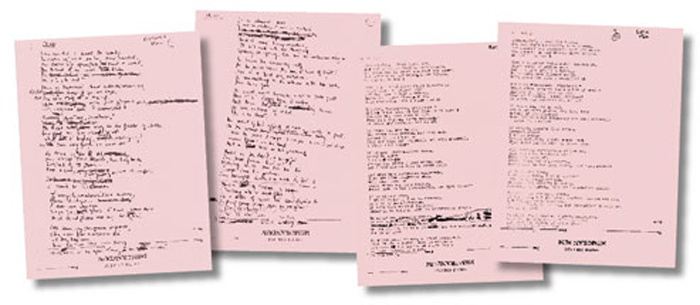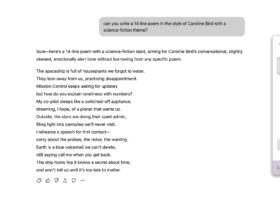The rejections behind poem acceptances

Apparently I’m well known for broadcasting my rejections, but that’s no reason not to tell of the acceptances. Just when I was thinking I’d lost my way (the second half of 2015 was particularly bleak in terms of one rejection after another) some poems have come good. Specifically: a poem forthcoming in Poetry News, another in The Interpreter’s House and three in Bare Fiction, in which I’ve never made an appearance so I’m particularly encouraged by that. Two of the five were ‘problem children’, as you can see from the stats below.
I have a relatively new-found interest – looking at the drafts/rejection history of a poem once it’s accepted to see it I can learn anything from it. I love being able to write poetry on the computer. I save all drafts, or rather I save a draft the last time I work on it during a day. So generally I save one draft per day max. Otherwise ‘version control’ would be pretty much out of control. But I find I do go sometimes back to old drafts, and it can be a great help in moving the poem forwards years later. Looking at historic drafts, scrawled across with the workings-out of poets before the word processor, I wonder how they managed to see clearly where the poem was going – all those pen and ink changes, then typing (or writing) it out again, only to find the line breaks or form just looks wrong.
Details, details
Here are the timelines for each of the forthcoming poems – (they’re not in the same order as above):
Poem A – written April 2015, 4 drafts, 1 previous rejection
Poem B – written June – October 2015, 2 drafts, 2 previous rejections
Poem C – written Jan 2013 – Jan 2016, 19 drafts, 5 title changes, at least 6 previous rejections (I am so pleased to see the back of this this one find a home!)
Poem D – written Jan 2014 – March 2016, 8 drafts, 2 previous rejections
Poem E – written November 2015 – March 2016, 5 versions, 1 previous rejection
Interesting that there’s really no pattern to all this, but I think it does show that the ‘bottom drawer’ thing is useful – at least a couple of these poems had been put away for some months before I got them out and worked on them again. Of course, there are plenty of others in the bottom drawer and who knows if any of them will come to anything. But the process is fun, isn’t it? Just as long as SOME of them find homes eventually.
One thing I’ve noticed is that (if one can believe the hype!) submissions to magazines seem to be ever increasing, and magazine editors are under more pressure than ever. In this climate, congratulations are due to those editors who manage expectations and communicate well about where they are in the process. I hope, for their sake, that giving Facebook or website updates reduces the number of email enquiries from individuals. I certainly feel that the submissions turnaround times are at least as good as they always were, despite the rising tide of submissions.
Rejections (actually I prefer ‘Failed Submissions’)
On the thanks but no thanks front, in the last couple of months I’ve seen 5 poems sink without trace in competitions and 9 poems rejected by magazines. Ah well.
I now have nothing outstanding – eek! Must get something out!



Thank you for sharing and congrats Really switched on as commenting on smart phone for first time and on a train…no stopping this woman now…
Thanks Ann, and well done with the tech…!
Congratulations Robin, and thanks for sharing. I find other poet’s acceptance/rejection experiences fascinating, just goes to show poetry is very subjective! I wanted to re-blog/share this on my own blog but can’t figure out how to do it! Never mind 🙂
Thanks a lot Julie! I need to find a plugin that acts like the ‘reblog this’ and ‘like’ buttons on WordPress.com. Thanks for the prompt 🙂
Astonished after 30 years of teaching that you have had the patience and tenacity to do this, Robin.
It may well be the case that numerous “well-known” poets with several collections and numerous “accepted for next issue” pieces to their name also undertake such recordings of their progress.
I rarely met students who really took any notice of “improvement” comments, and writers who fail to work out “what went wrong” and try to put it right in my experience are not at all numerous.
Thanks for clarifying, and hope your message is taken on board.
Hi Christo and thanks for your comment. I suppose it depends on the poem and how strongly the poet feels about it. Not all redrafts are prompted by a rejection, and as Julie says, judgements are subjective. Thank you for suggesting it’s down to patience and tenacity – two qualities I wouldn’t immediately claim to have! Another factor that improves over time I think is getting a feel for which poems are likely to suit which publications. When I look at some of the poems I sent in the past to mags like Poetry London or PN Review I rather cringe. Ooh, that could be another blog post!
Congrats, Robin, and thanks for sharing in such detail. You’ve no idea how inspiring these posts are.
Hello Jean and thank you for saying that, feedback on the blog is always much appreciated 🙂
A heartening and inspiring post Robin. I’ve not done these calculations until I started keeping a spreadsheet recently. I’m pretty sure I have had a similar experience too, but I envy your (justified) resilience.
I’ve also noticed how a poem that will have editors holding their noses will be taken a decade or more later. For a years my personal record stood at 17 years, for a poem that was eventually accepted by Poetry London. Recently I’ve had another accepted that I wrote in the late 80s. I’m not trying to claim that I’m some kind of visionary ahead of the curve, but there are fast-moving trends in poetry publication, and a waiting game can sometimes pay off as well.
Hi Peter, that’s really interesting – 17 years! Blimey. Never say never.
As ever, very interesting Blog, Robin. I’ve found the Stanza meetings useful for inspiring me to rework a poem that’s not quite ‘there’ – spurred on by the feedback from Stanza members. I hadn’t entered anything for a while . . . so got my act together last month, and entered three competitions. Let’s see . . .
Hi Jill, and thanks for commenting. I’ve certainly found the Hastings Stanza group very perceptive – happy to give constructive criticism but very little ‘saying something for the sake of it’ that can occur in workshops (I know, I’ve been guilty of it myself on occasion). Good luck with your comp entries!
As above! The ist of submission windows is v helpful, but I found this post weirdly uplifting – certainly I relate to it, and I appreciate someone lifting the lid on the process. Perhaps the furrow I plough is not as lonely as it can appear at times.
Hi Robin – just read your poem in Poetry News and so enjoyed it. Congratulations! Thanks for sharing your experiences of poetry ‘rejections’ and acceptances. I think it was Stephen King who stuck all his rejection letters on his bedroom wall. I might have to move into a bigger room!
Hi Deborah and thanks so much for your comment & kind words… keeping rejection letters is quite funny. John McCullough recently suggested keeping the little notes that come with acceptances, too, and putting them in a box or a scrapbook. Then when you’re feeling a bit like ‘my poems are all rubbish’ then you can look at the ‘happy box’ and get a quick burst of confidence!